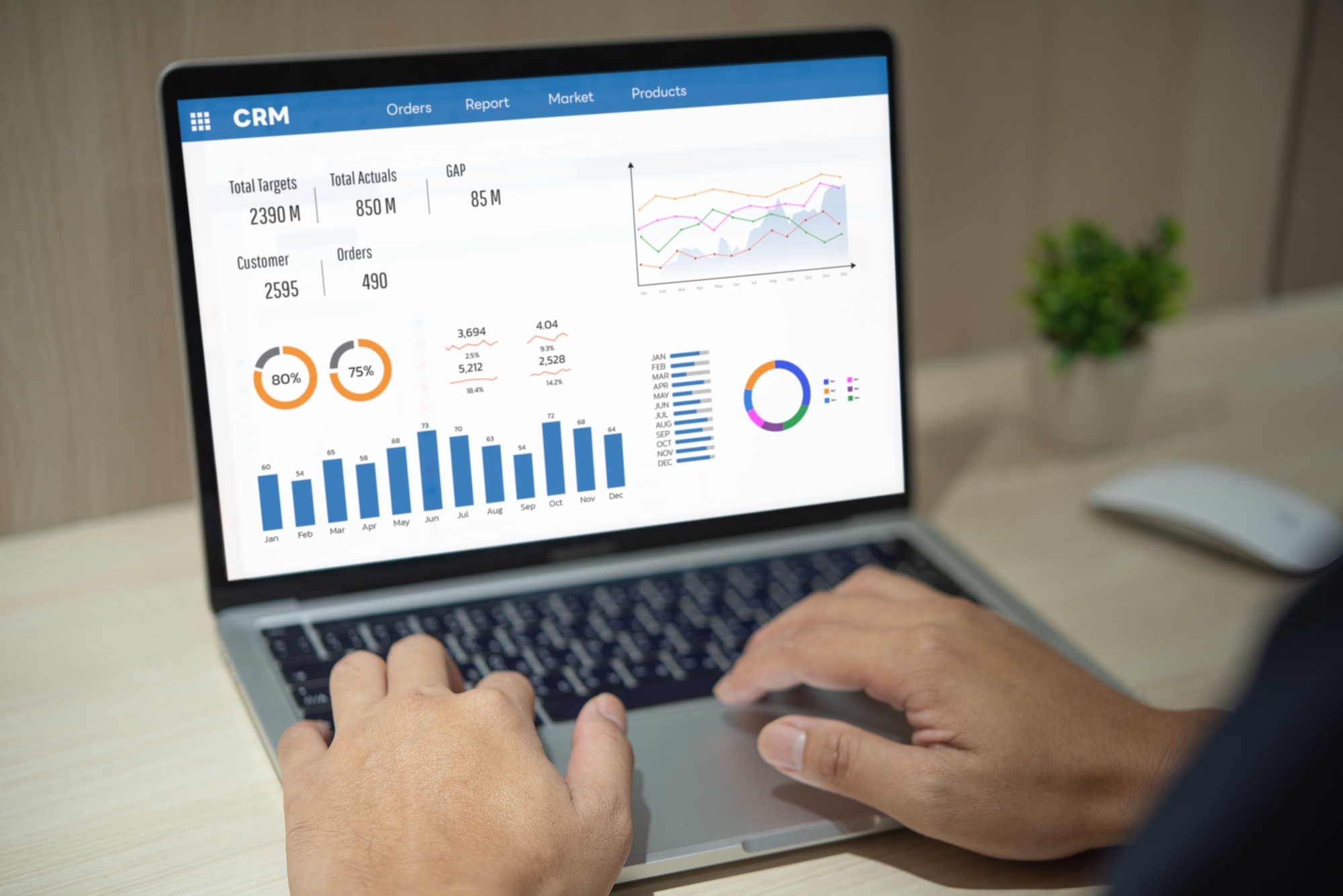Key Takeaways

- Enhanced Accessibility: Cloud CRM offers access to customer data from any device with internet connectivity, ensuring availability anytime and anywhere, which improves customer service.
- Cost Efficiency: Utilizing cloud CRM eliminates hefty upfront hardware costs and operational expenses, resulting in potential savings of up to 20% on infrastructure investments.
- Improved Collaboration: Real-time access to customer information fosters collaboration among team members, enhancing communication and decision-making processes across your business.
- Robust Security Measures: Advanced security protocols protect sensitive customer data, minimizing risks of data breaches and ensuring compliance with regulations like GDPR and CCPA.
- Scalability and Flexibility: Cloud CRM systems are designed to grow with your business, allowing easy modifications in features, user access, and storage without incurring significant costs.
- Integration Capabilities: Seamless integration with other essential tools (like email and accounting software) enhances productivity and streamlines workflows for better customer relationship management.
In today’s fast-paced business world, staying connected with customers is more crucial than ever. Cloud CRM is revolutionizing how companies manage their relationships, offering flexibility and accessibility that traditional systems simply can’t match. Imagine having all your customer data at your fingertips, accessible from anywhere, anytime. That’s the power of cloud-based solutions.
With cloud CRM, you can streamline your sales processes, enhance customer interactions, and make data-driven decisions that drive growth. Whether you’re a small startup or a large enterprise, embracing this technology can transform your customer relationship management, making it more efficient and effective. Let’s dive into the benefits and features that make cloud CRM a game-changer for businesses like yours.
Overview of Cloud CRM

Cloud CRM (Customer Relationship Management) offers small businesses an efficient way to manage customer relationships while leveraging technology. By utilizing cloud-based systems, you access customer data from any device with internet connectivity, ensuring you stay connected regardless of your location.
Cloud CRM streamlines your sales processes, allowing for quick updates and real-time data access. This flexibility fosters improved interactions with customers. You can respond promptly to inquiries or adjust sales strategies based on the latest insights.
In addition, cloud CRM technology enables you to make informed, data-driven decisions. This capability enhances your sales forecasting and marketing strategies, essential for growth. Whether your business is small or large, adopting this innovative tool can significantly optimize how you manage customer relationships.
Key Features of Cloud CRM

Cloud CRM systems provide essential capabilities for small businesses that enhance customer relationship management. Understanding these features helps you leverage technology effectively.
Scalability and Flexibility
Scalability ensures cloud CRM adapts to your business’s growth. You can easily add users, features, or storage without significant costs. Flexibility allows you to customize the system to fit your specific needs, whether you’re managing a handful of clients or expanding into new markets.
Accessibility and Mobility
Accessibility enables you to access customer data anytime, anywhere. With cloud CRM, you can manage relationships from any device with internet connectivity, ensuring that you’re always equipped with the necessary information. Mobility supports your team, allowing field agents to update records or respond to customer inquiries on the go.
Integration Capabilities
Integration capabilities improve workflow by connecting your cloud CRM with other essential systems. You can link it with email, telephony, and accounting software, streamlining processes and enhancing productivity. This connectivity facilitates a seamless flow of data, allowing you to make informed decisions quicker.
Benefits of Using Cloud CRM

Cloud CRM systems offer numerous advantages for small businesses, enhancing efficiency and productivity. By leveraging cloud technology, you gain access to powerful tools that improve customer relationship management.
Cost Efficiency
Cloud-based CRM solutions provide significant cost savings for small businesses. You avoid hefty upfront investments in hardware and infrastructure, as these costs get eliminated. Remote servers managed by a third-party provider handle the software and data, allowing you to focus resources on other areas. Studies indicate that adopting cloud solutions can save companies up to 20% on infrastructure expenses. Additionally, operational costs decrease since the provider manages software updates and maintenance, helping you allocate funds toward initiatives that drive growth.
Improved Collaboration
Cloud CRM fosters greater collaboration among your team members. You can access customer data and share information seamlessly, regardless of your location. This real-time access ensures that all employees stay updated, improving communication and teamwork. With remote access capabilities, team members in different geographic areas can engage with clients effectively, enhancing overall customer interactions. Improved collaboration leads to faster decision-making processes, allowing your small business to respond swiftly to customer needs.
Enhanced Data Security
Data security is paramount for small businesses, and cloud CRM systems prioritize it. These solutions utilize advanced security measures to protect your sensitive customer information. Regular backups and updates managed by the provider minimize risks associated with data loss or breaches. By adopting cloud-based technology, you benefit from expert security protocols, allowing you to maintain the trust of your customers while focusing on relationship management.
Popular Cloud CRM Solutions

Cloud CRM solutions empower small businesses to enhance customer relationships effectively. Two popular options are Salesforce, HubSpot, and Zoho CRM, each offering unique features tailored to meet your business needs.
Salesforce
Salesforce provides advanced sales tools that streamline sales processes. It includes activity tracking, email integration, customizable pipeline management, and robust opportunity management. Advanced forecasting capabilities and real-time sales performance dashboards keep you informed about sales trends. Salesforce’s customization and scalability accommodate complex business processes, ensuring that as your small business grows, the technology adapts. Workflow automation features elevate efficiency, assisting with territory management and maintaining enterprise-grade security.
HubSpot
HubSpot simplifies CRM with its user-friendly interface and essential features. It offers tools for tracking interactions and managing contacts effortlessly. HubSpot’s marketing automation integrates seamlessly, helping you create campaigns that engage prospects effectively. The platform also provides analytics for monitoring customer behavior, enabling you to make informed decisions. HubSpot’s free tier offers essential functionalities for small businesses to test the system without upfront costs.
Zoho CRM
Zoho CRM stands out for its affordability while delivering dependable functionality. It features customizable modules that allow you to tailor the system to your business’s requirements. Zoho’s sales automation capabilities facilitate task assignments and monitor sales activities. The integration with other Zoho applications optimizes workflow for improved efficiency. With a focus on small businesses, Zoho CRM delivers essential tools designed to foster long-lasting customer relationships.
Challenges and Considerations

When implementing cloud CRM solutions, you face several challenges and considerations that can impact your small business. Understanding these issues is crucial for leveraging the full potential of technology.
Data Privacy Issues
Data privacy remains a critical concern for small businesses using cloud CRM systems. Sensitive customer data stored in the cloud risks exposure to cyber threats and data breaches. According to the Cybersecurity & Infrastructure Security Agency, nearly 90% of organizations have experienced a data breach in some form. Ensuring compliance with regulations like GDPR and CCPA complicates the implementation. Robust security measures, such as encryption, multi-factor authentication, and regular security audits, serve as vital defenses. You must prioritize these safeguards to maintain the confidentiality, integrity, and availability of customer information.
https://www.youtube.com/watch?v=EfK0SURQ8X0
Implementation Difficulties
Implementation challenges often arise when integrating cloud CRM into existing systems. Small businesses encounter issues with data migration, configuration, and user adoption. According to a report by TechCrunch, about 70% of CRM implementations fail due to poor user adoption. Ensuring a smooth transition requires comprehensive user training and continuous technical support. Additionally, tailoring the CRM system to fit your specific needs can prove demanding. It’s essential to plan effectively and allocate resources to address these challenges, streamlining the implementation process and maximizing your investment in cloud technology.
Conclusion

Embracing cloud CRM can revolutionize how you manage customer relationships. With its flexibility and accessibility, you can connect with your customers anytime and anywhere. This technology not only streamlines your sales processes but also enhances collaboration within your team.
By leveraging the right cloud CRM solution, you can make informed decisions that drive growth and improve customer interactions. As you navigate the challenges of implementation, remember that investing in user training and robust security measures is essential for success.
Ultimately, adopting cloud CRM can position your business for long-term success in today’s competitive landscape.
Frequently Asked Questions

What is cloud CRM?
Cloud CRM (Customer Relationship Management) is a technology platform that manages a company’s interactions with customers through cloud-based solutions. This allows businesses to access customer data, track interactions, and manage relationships from any device with internet connectivity.
How does cloud CRM benefit small businesses?
Cloud CRM helps small businesses manage customer relationships efficiently by offering scalability, accessibility, and cost-effectiveness. It provides real-time data access, streamlined sales processes, and integration with other systems, enhancing overall operational efficiency.
Can cloud CRM improve customer interactions?
Yes, cloud CRM enhances customer interactions by providing teams with immediate access to customer information and communication histories. This enables personalized and timely responses, fostering better relationships and improving customer satisfaction.
What are some popular cloud CRM solutions?
Popular cloud CRM solutions include Salesforce, HubSpot, and Zoho CRM. Each offers unique features: Salesforce focuses on advanced sales tools, HubSpot offers user-friendly interfaces and marketing automation, and Zoho CRM is known for its affordability and customization options.
What security measures are in place for cloud CRM?
Cloud CRM systems employ advanced security measures, such as data encryption, multi-factor authentication, and regular updates, to protect sensitive customer information. This enhances data security and maintains customer trust in the technology.
What challenges can businesses face when implementing cloud CRM?
Challenges in implementing cloud CRM include data privacy concerns, potential cyber threats, and difficulties in data migration and user adoption. Ensuring robust security measures and providing comprehensive training can help mitigate these issues.
How does cloud CRM support data-driven decision-making?
Cloud CRM systems facilitate data-driven decision-making by providing access to real-time analytics and customer insights. Businesses can analyze customer behavior, forecast sales, and design targeted marketing strategies based on accurate data.
Is cloud CRM accessible from multiple devices?
Yes, cloud CRM systems are accessible from any device with internet connectivity. This mobility allows team members to manage customer relationships and access information on-the-go, enhancing productivity and responsiveness.
Image Via Envato



